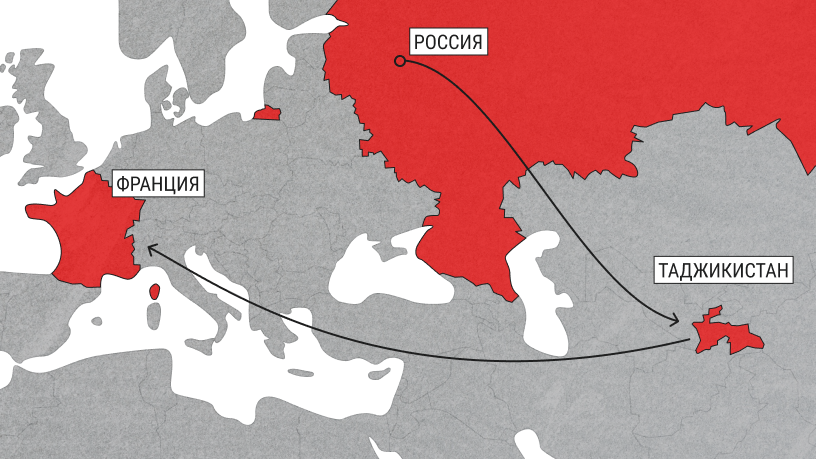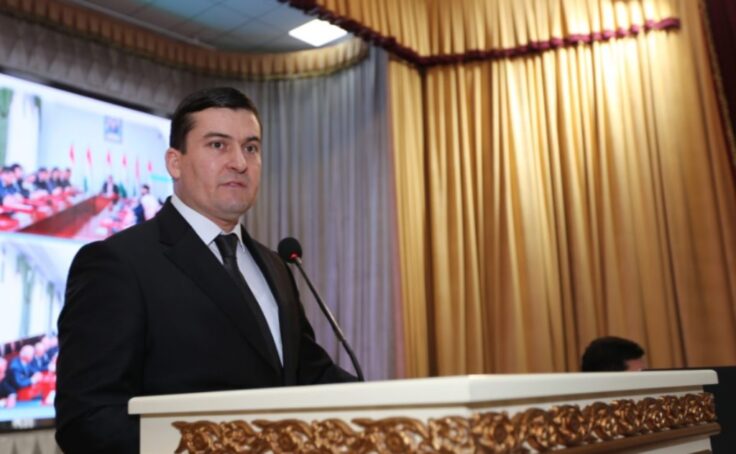
In a previous Plagiarism Navigator investigation, we exposed Iranian scholars who defended stolen Russian dissertations—translated into Tajik—at Tajik universities. They exploited a loophole known as “dissertation tourism,” which offers a backdoor into the global academic community: via Tajikistan and Russia’s Higher Attestation Commission (VAK). Unsurprisingly, Tajik scholars themselves have embraced this backdoor enthusiastically. With the highest number of plagiarized dissertations per capita, Tajikistan tops Dissernet’s global rankings by a wide margin. Today, we examine the career of Kobiljon Khushvakhtzoda—a former provincial accountant who climbed the ranks to become Chairman of Tajikistan’s Academy of Sciences.
Previously in Plagiarism Navigator
- Episode 1: China-Ukraine-Poland – The story of a Chinese scholar who defended a dissertation in Kharkiv, cobbled together from Russian-language works translated into Ukrainian.
- Episode 2: Russia-Tajikistan-Iran – The case of Iranian scholars obtained degrees in Tajikistan (2011–2013) under Russia’s VAK system.
- Episode 3: Russia-Serbia-Turkey-Switzerland-Lithuania – The tale of a Serbian academic who resorted to buying co-authorships and outright plagiarism.
- Episode 4: Russia-USA-Brazil-UK-Switzerland-India – A professor at Sechenov University who infiltrated an Iran-Iraq publication scheme in top Western journals, creating a lucrative paper mill within his own institution.
- Episode 5: Russia-Ukraine-Romania-India – The story of Andriy Vitrenko, Ukraine’s former deputy Minister of Education and Science, whose dissertation and academic papers were found to contain plagiarism.
- Episode 6: Russia-Ukraine – The tale about how wartime cross-border plagiarism became a monetized scheme for inflating academic metrics.
In 2018, a working group established by Tajikistan’s Ministry of Education and Science concluded that “the activities and credibility of the Dissernet community are questionable, and basing decisions on their findings would be erroneous.” However, by 2020, President Emomali Rahmon not only acknowledged that 40 scholars had been accused of plagiarism by Dissernet, but expressed his dissatisfaction – notably not with Dissernet, as might be expected, but with the scholars themselves: “It has become apparent that some Tajik academic candidates have chosen an undemanding scholarly path, liberally appropriating the research of foreign scholars.” Moreover, the president declared that “henceforth, government members, their deputies, and other officials will only be permitted to write and defend dissertations upon receiving approval from a scientific institution and submitting a personal petition to the head of state.”
Did these measures help? A small-scale investigation published in April 2024 by Radio Liberty’s Tajik service revealed that not only had none of the officials exposed by Dissernet for plagiarism been stripped of their academic degrees – on the contrary, some high-ranking officials with copied dissertations had actually received promotions. For readers’ convenience, we’ve presented the investigation’s findings in a compact table.
Kobiljon Khushvakhtovich Khushvakhtzoda (b. 1982) has achieved a remarkable career trajectory over twenty years. Until 2019, he bore the surname Barfiev—reflecting a well-established trend in Tajikistan of discarding surnames and given names that sound “too Russian.” Under this former surname, he graduated in 2004 from Tajik National University (TNU) with a degree in “Accounting, Analysis, and Auditing.” By 2010, already serving as Associate Dean for Academic Affairs at TNU’s day division, he defended his Candidate of Sciences (PhD) dissertation in economics. The work bears the unmistakable hallmarks of Iranian dissertations defended in Tajikistan under the auspices of Russia’s VAK: the entire text is plagiarized from a single source, essentially constituting someone else’s dissertation with only the title page replaced.

It is noteworthy that the true author of the Barfiev’s dissertation—Professor Golovin from Kursk—is also a “client” of Dissernet. Among other things, he served as the academic advisor for a doctoral candidate who was later stripped of their degree. It is possible that Golovin’s own dissertation, in turn, was plagiarized from someone else. Worth mentioning separately is the fact that TNU is not only Tajikistan’s leading higher education institution but also one of Dissernet’s top offenders in terms of detected violations (24 plagiarized dissertations defended, 20 faculty members involved in either plagiarism or participating in fraudulent defenses as advisors or opponents). The defense was successfully held at the Tajik Agrarian University named after Sh. Shotemur (33 plagiarized dissertations defended, six staff members implicated in misconduct).
Attempting to read the dissertation leaves one with the distinct impression that the text was never meant to be read—at best, skimmed superficially. To facilitate this, the authors didn’t limit themselves to merely replacing “Russia” with “the Republic of Tajikistan.” Instead, they littered the text with clumsy markers of “Tajikization”: “fermer khozyaystvo” (farm enterprise) was dutifully altered to “dekhkan (fermer) khozyaystvo,” (dekhkan (farm) enterprise) “the process of raskrestyanivaniye” (de-peasantization) became “the process of razdekhkanizatsiya,” (de-dekhkanization) and so on. Yet not all substitutions were made. One particularly jarring passage declares: “The agrarian reform has elevated Tajikistan to an in significant position in terms of growth rates within the framework of certain places in Europe.” Even disregarding the sentence’s tortured syntax, its meaning remains opaque. What, precisely, is an “in significant position”? Does this imply the reform was a failure?
The puzzle pieces fall into place when comparing this text to Professor Golovin’s original work. The source material discusses Stolypin’s agrarian reforms, which recognized that Russia’s pre-1905 policy of preserving peasant collectivism stifled agricultural growth—necessitating the development of a independent farming class.
However, Barfiev-Khushvakhtzoda’s dissertation, with its haphazard contextual substitutions, produces surreal results. Amidst a discussion about modernizing Tajikistan’s feudal farms into dekhkan communes, the text abruptly declares: “The most significant change for Russia was the abolition of serfdom.” Later, it asserts: “In our view (replacing Stolypin’s original argument — T-invariant), the emergence of a dekhkan class would enable reforms.” A glaring contradiction follows: if these reforms were merely speculative, why does the next page celebrate the agrarian reform’s success in elevating Tajikistan to “an in significant position” in growth rankings? The original text, of course, praised how Stolypin’s reforms “made Russia one of Europe’s agricultural leaders.” Further commentary seems redundant. Why wasn’t Barfiev-Khushvakhtzoda stripped of his degree, like the aforementioned Iranian researchers? The answer is simple: under Russian law, the 2010 cutoff date places his case beyond the statute of limitations for revocation.
The House That Jack Built
According to the Tajik Academy of Sciences, Khushvakhtzoda has published 270 articles and 50 textbooks. Given the dissertation’s irregularities, it’s hardly surprising that some of his articles were plagiarized from Russian sources. But what truly astonished us was the matryoshka doll (or perhaps the house that Jack built) layering of academic theft: the author appears to have deliberately targeted texts by other Dissernet-exposed figures—figuring their work was “safe” to plagiarize.
Let’s begin by examining two 2016 articles published by our protagonist (then head of the Department of Economic Analysis and Audit at TNU) in Russian-language journals.
“Osnovnye napravleniya sistema statisticheskikh pokazateley effektivnogo ispolzovaniya zemelnykh resursov” (“Key Directions System of Statistical Indicators for Efficient Land Use”) (original spelling preserved) was published in the journal “Economics and Business: Theory and Practice” (a publication flagged by Dissernet). The article constitutes verbatim plagiarism from two Russian-language sources: a dissertation defended 12 years earlier in Oryol; a paper co-authored by two researchers from Bokhtar University – one of whom, Associate Professor Zokirjon Asrorov, had his academic degree revoked following a Dissernet investigation.
“Teoriya ponyatiynogo apparata upravlencheskogo ucheta sel’skokhozyaystvennykh organizatsiy na osnove uchyotno-analiticheskogo kompleksa” (“Theoretical Framework of Managerial Accounting Terminology for Agricultural Enterprises Based on an Accounting-Analytical System”) — this co-authored publication by Khushvakhtzoda and his TNU colleague Seredzhiddin Mirzonov represents a perfect case of matryoshka-style plagiarism:
- The article was copied verbatim from the doctoral dissertation of Natalia Kozlyuk from Oryol State University (again in Oryoll).
- The Oryol dissertation itself contains improper borrowings, including material taken from the thesis of Kozlyuk’s colleague at OSU, Elena Malkina.
- Malkina is known to Dissernet because two dissertations she supervised were later revoked due to plagiarism.
The Path to Rectorship: A Kyrgyz Doctorate
In 2018, the plagiarism in Khushvakhtzoda’s candidate dissertation came to light. By then serving as head of TNU’s accounting department, he decided to hedge his bets: in 2019, he traveled to Kyrgyzstan to defend a doctoral thesis. This “dissertation tourism” to Kyrgyzstan is as well-established a practice as similar trips to Tajikistan, with one key difference—Kyrgyz dissertations remain inaccessible for verification (the 32 Kyrgyz scholars with plagiarized theses listed on Dissernet all obtained their degrees through Russian defenses under the VAK system).
While we cannot examine Khushvakhtzoda’s doctoral dissertation directly, we can certainly evaluate the circumstantial evidence surrounding his defense. The thesis was approved at two universities in Bishkek:
Jusup Balasagyn Kyrgyz National University (Dissernet records show 17 plagiarized dissertations defended here, including three faculty members with fraudulent dissertations);
Kyrgyz-Russian Slavic University (Dissernet has documented 20 plagiarized defenses at this institution, involving five faculty members with fraudulent dissertations – including the rector, who is a named subject in Dissernet investigations).
The Kyrgyzstan defense scheme proved spectacularly successful, and in 2020 Khushvakhtzoda ascended to the rectorship of his alma mater, Tajik National University. Notably, that same year the President of Tajikistan publicly decried the numerous cases of plagiarized dissertations among government officials uncovered by Dissernet – yet this did nothing to prevent our protagonist, with his demonstrably fraudulent candidate’s thesis, from assuming the university’s highest post.
A Rector’s Routine
The newly minted rector’s 2021 publications—co-authored with colleagues from other Tajik universities—revealed yet another form of academic misconduct: translated plagiarism. These articles, published in Tajik academic journals, were lifted from Russian-language dissertations and rendered into Tajik without proper attribution: source 1 – a 2017 Russian dissertation, source 2 – a 2010 Russian dissertation.
In 2023, as the culmination of his rectorship, Khushvakhtzoda published a sole-authored paper in the French journal E3S Web of Conferences (indexed in Dissernet and Scopus but excluded from WoS). The article constitutes a case of translated plagiarism from Russian to English, with its source being a 2003 Russian dissertation – making the stolen content twenty years old at the time of publication. To create an illusion of relevance, the author “refreshed” certain dates in the bibliography: the Russian translation (1999, St. Petersburg) of “Strategic Cost Management” by J. Shank and V. Govindarajan was relabeled as a 2019 publication in the English references (a logically consistent move – if repurposing 20-year-old text, why not update cited works by the same margin?). The original dissertation author, E.M. Dusaeva, has her own Dissernet record: while her personal dissertation remains unexamined, a 2006 thesis she supervised was cobbled together from two others’ works. A closer examination of the citation trails and plagiarism analyses in Kobiljon Khushvakhtzoda’s publications reveals a disturbing pattern of systematic, large-scale academic theft worthy of his rectoral status – with entire research frameworks, including original diagrams and tables, being appropriated without attribution.
We previously mentioned the “end of the rectorial career,” though not because the plagiarist was ousted from his position. In January 2024, Kobiljon Khushvakhtzoda became the President of the National Academy of Sciences of Tajikistan. Yet just four months later, in May 2024, Tajikistan’s president once again denounced improper dissertation defenses by officials during a meeting with scientists and educators. Then, in February 2025, while congratulating his compatriots on the advent of the holy month of Ramadan, he reminded them that, according to Islam, one must live with integrity.
Will the president’s latest statements make any difference? As long as Kobiljon Khushvakhtzoda remains head of the Academy of Sciences — unlikely.
All details regarding the ethical violations uncovered in the work of Tajikistan’s top scholar can be found on his profile in Dissernet.
Support T-invariant’s work by subscribing to our Patreon and choosing a donation tier.